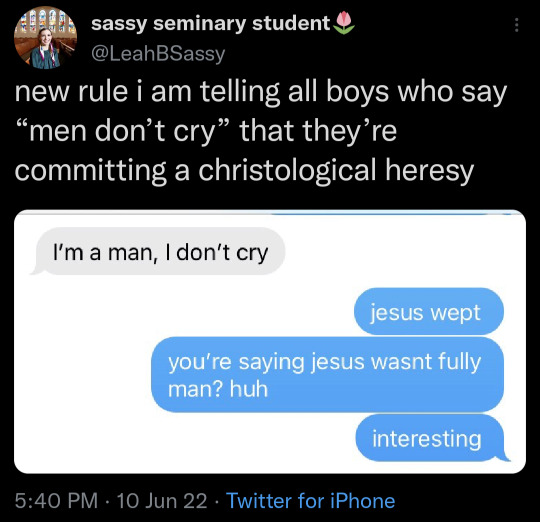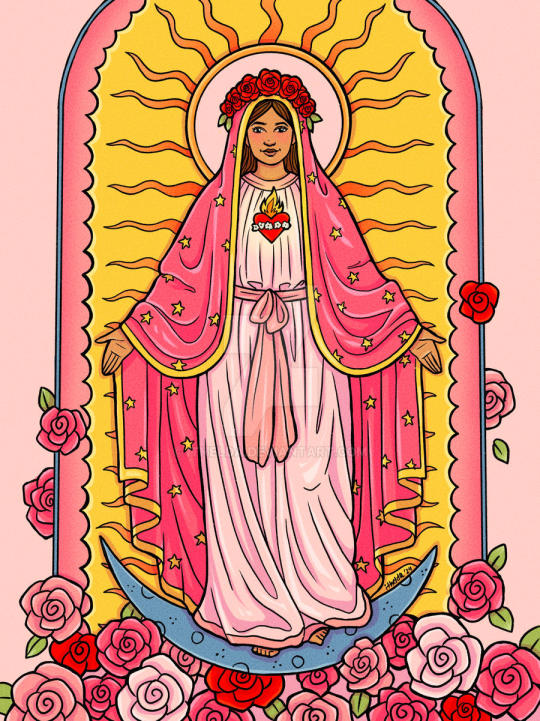Don't wanna be here? Send us removal request.
Text

you punch nazis!
(requested by anonymous)
219K notes
·
View notes
Text
Reblog daily for health and prosperity

219K notes
·
View notes
Text
Sorry I thought about Jesus reuniting with His father Joseph when He died and it broke me a little.
150 notes
·
View notes
Text

Paradise, the fresco decorating the interior dome of the baptistry of Padua Cathedral, painted by Giusto de' Menabuoi, circa 1378.
We have baptism, brethren, for regeneration and divine birth, one faith, one hope, one God, who is above all and through all and in us all. In His love, He gathers us together to Himself and makes us members of and one of Himself.
Gregory Palamas (On Peace §3a, a homily given in December of 1350 or January of 1351)
192 notes
·
View notes
Text

The Baptism of Christ with Dove, by Daniel Bonnell
When Jesus Christ baptized was, the Holy Ghost descended with grace; the Father's voice was heard in that place: Hic est Filius meus, ipsum audite.
There were three Persons and one Lord, the Son baptized with one accord, the Father said these blessed words: Hic est Filius meus, ipsum audite.
Consider now, all Christianity, how the Father said because of thee the great mystery of the Trinity: Hic est Filius meus, ipsum audite.
Now Jesu, as Thou art both God and man, and were baptized in the river Jordan, at our last end, we pray Thee, say then: Hic est Filius meus, ipsum audite.
David Yardley, Jhesus autem hodie regressus est a Jordane
4 notes
·
View notes
Text

Mother Church, by Ilse Wefers.
For, even as God wills all men to be saved, and to arrive at the knowledge of the truth; even as Christ came to save what had perished and to gather together the children of God who had been dispersed; so the Church, constituted by God [as] the Mother and Teacher of all nations, knows its own office as debtor to all, and is ever ready and watchful to raise the fallen, to support those who are falling, to embrace those who return, to confirm the good and to carry them on to better things. Hence it can never forebear from witnessing to and proclaiming the truth of God, which heals all things, knowing the words addressed to it: "My Spirit that is in thee, and My words that I have put in thy mouth, shall not depart out of thy mouth, from henceforth and forever" [Isaiah 59:21].
from the Prologue of Dei Filius
10 notes
·
View notes
Text
The atomic habits of St. Therese of Lisieux

I used to be one of those people that were like “oh I love St. Joan of Arc, St. Thomas Aquinas, St. Paul, St. Teresa of Avila” because I thought they were Cool and Heroic and they did Big Things
And whenever someone would talk about “The Little Flower of Lisieux” I was like “mehhhhh… okay”
Not in a way that was totally disrespectful, but not totally aware of the enormity of her interior life
Because guys
Wow
You’d have to read The Story of the Soul to really appreciate just WHY she is a doctor of the Church
(She’s the Doctor of Divine Love, btw)
Because St. Therese? She was in the details
They like to say the devil is in the details, but let’s face it— God is in the details, and in his mercy and wisdom, he placed St. Therese there for us to learn from and imitate in our own ways
She had to reconcile her great desire to be a saint with the enormous legacies of the saints that came before her, especially Joan of Arc and St. Teresa of Avila
(She, along with St. Joan, are the patron saints of France. I’m sure that’s something St. Therese never dreamed of)
And she had the realization that God would not have given her a desire that she was incapable of, and that there must be a way for someone “as small as her” to become a great saint
Which lead her to meditate on Mathew 18:4 (Whoever humbles himself like this child is the greatest in the kingdom of heaven)
And she was like “oh, okay. This desire planted into my heart is an invitation to become a little child, because the Lord wants to be the one to carry me to Heaven”
(I am heavily paraphrasing so that you guys won’t be spoiled for Story of a Soul. Go read it!!!)
All of this is to say that her writings and her life reflect a simple but profound theology
The Little Way is one of total dependence on the providence of God, of total surrender and self-mortification— the emptying of the cup of one’s self little by little, so that the Lord can fill it with his graces and abundance, and ultimately, with His own divine self
The Little Way is one of the smallest acts of radical love, because the only person who needs to see it is God
The Little Way is St. Therese going out of her way to nurse the nuns that she didn’t get along well with
The Little Way is St. Therese is doing her best to hold cheerful conversations with a particularly surly nun
The Little Way is St. Therese relishing being splashed with dirty laundry water as a sign of the smallest of suffering that only God would see
I called this particular post her “atomic habits,” because she believed that small acts can lead to holiness when done with great love for our Lord
Small acts of love and self mortification were the things that she sought for while in the Carmel
St. Therese elucidated in her signature sincere and effervescent style the enduring idea that there is no suffering too small, no act of love too small, to offer the Lord— because what he wants is souls, what he wants is us
That’s not to say that her interior life was always rich
She suffered so much from months of aridity that she grew an affection for atheists, even going so far to say, and I quote:
[God] allowed my soul to be overwhelmed with darkness, and the thought of Heaven, which had consoled me from my earliest childhood, now became a subject of conflict and torture. This trial did not last merely for days or weeks; I have been suffering for months, and I still await deliverance. I wish I could express what I feel, but it is beyond me. One must have passed through this dark tunnel to understand its blackness ... When I sing of the happiness of Heaven and the eternal possession of God, I do not feel any joy therein, for I sing only of what I wish to believe. Sometimes, I confess, a little ray of sunshine illumines my dark night, and I enjoy peace for an instant, but later, the remembrance of this ray of light, instead of consoling me, makes the blackness thicker still.
It’s thought that St. Therese experienced this interior anguish up until the end of her battle with tuberculosis, with her final words being: “My God, I love you!”
To summarize everything, reading St. Therese is a study not only of radical love, but also radical humility
From a spoiled child to a martyr of the Carmel, St. Therese lived an inner life that very few of her own sisters in the convent were aware of
Her life is also a testimony to God's perfect timing; St. Therese wanted to be a missionary in Hanoi, but was prevented from doing so when she contracted tuberculosis. She was later named a patron saint to missionaries.
St. Therese's Little Way informed the spirituality of many of the saints and intellectuals that came after her: St. Josemaria, St. John Paul II, Mother Teresa, St. Teresa of the Andes, Blessed Cecilia Eusepi, Hans Urs von Balthasar, and Dorothy Day
On her feast day, let’s take the time to reflect on what small things we can do today for the Lord; what small sufferings we can offer him with great love and humility
God would never inspire me with desires which cannot be realized; so in spite of my littleness, I can hope to be a saint. — St. Thérèse of Lisieux
St. Therese of Lisieux, pray for us.
514 notes
·
View notes
Text

[O]ur devotion to Mary should always be Christ-centered, for she always points to her Son and says, "Follow Him!"
Rev. Jude Winkler, O.F.M. Conv.
11 notes
·
View notes
Text
I feel this in my soul. Try being the lowgrade goth girl who watches classic horror movies and you can barely mention that around far too many Christian women without getting preached at about even the Universal Monster movies from the 1930s being satanic. Ugh.
we need more Christians with weird kinda fucked-up interests I CANNOT keep going to women's events and talking about the weather
584 notes
·
View notes
Text
As a Catholic committed to non-violence and the dignity of every human life I do not celebrate the death of anyone, no matter how ‘deserved’ it may seem.
That being said rich people need to start redistributing their wealth to the poor and becoming monks and hermits again. St. Francis of Assisi, please, you know it would be hilarious and beautiful if Jeff Bezos donated his wealth, broke up his assets, surrendered his possessions, and became a friar.
36 notes
·
View notes
Text
the thing that gets to me about "purity culture" is how women's bodies are objectified. like yes, okay, being pure is good for you and super healthy for your soul but if you've had sex you are not a licked cupcake. you are not a chewed stick of gum, or a crumpled piece of paper. if you haven't been living the most holy pure life ever guess what? you're normal, you're not alone, you're not broken or damaged, you're completely lovable and completely worthy, and you are still called to chastity like everyone else.
purity is not a god you worship. you are not a virgin sacrifice to it. you are not to lay prone on the altar to be burned. you can kiss your boyfriend before you get married. if you've messed up you can try again. if you've made mistakes you are still good. chastity is a virtue, not a god. gods are worshiped. virtues are practiced.
452 notes
·
View notes
Text
the thing that gets to me about "purity culture" is how women's bodies are objectified. like yes, okay, being pure is good for you and super healthy for your soul but if you've had sex you are not a licked cupcake. you are not a chewed stick of gum, or a crumpled piece of paper. if you haven't been living the most holy pure life ever guess what? you're normal, you're not alone, you're not broken or damaged, you're completely lovable and completely worthy, and you are still called to chastity like everyone else.
purity is not a god you worship. you are not a virgin sacrifice to it. you are not to lay prone on the altar to be burned. you can kiss your boyfriend before you get married. if you've messed up you can try again. if you've made mistakes you are still good. chastity is a virtue, not a god. gods are worshiped. virtues are practiced.
452 notes
·
View notes
Photo

Lyrics to an old Shaker song, taking off from Matthew 5:6.
140 notes
·
View notes




